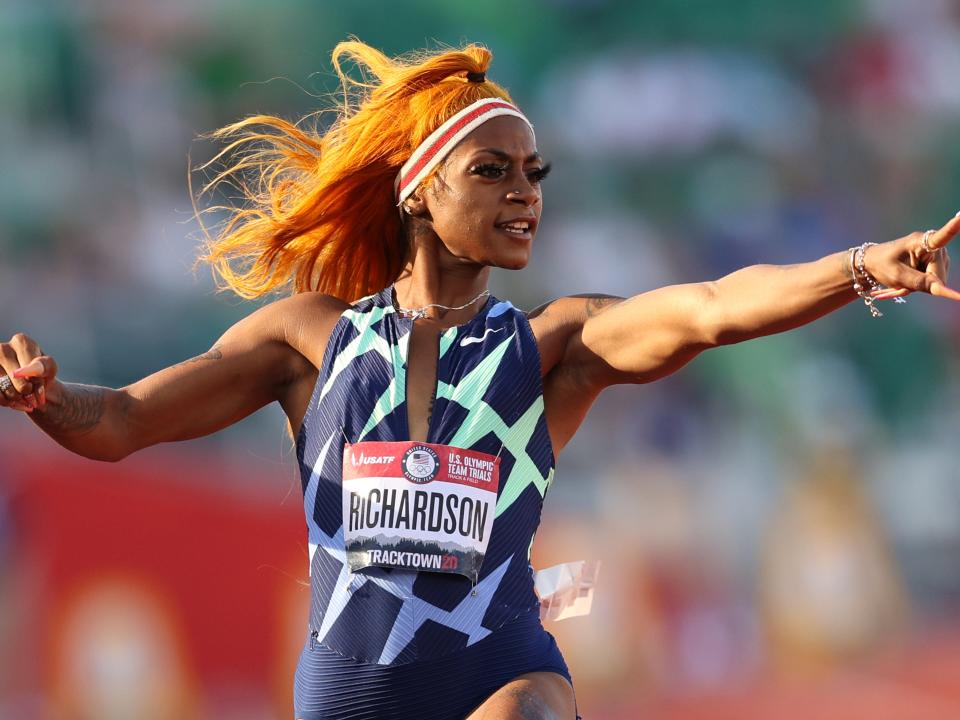Sha’Carri Richardson doesn’t want to be a god. When will we learn?

After testing positive for marijuana during a drug test, track star Sha’Carri Richardson has been suspended from the US Olympic Team, which may prevent her from attending the 2021 Tokyo Olympics. “I want to take responsibility for my actions,” she told Savannah Guthrie in an interview Friday on the Today show. “I know what I did, I know what I’m supposed to do ... and I still made that decision.”
Richardson entranced the public after winning the women’s 100-meter race last month at the US Olympic Track and Field Trials in Eugene, Oregon with a shocking time of 10.86 seconds. As well as lauding her clear athletic prowess, social media and news commentators often also commented on the personal appearance of 21-year-old Richardson. In their words, she was bright, blazing and powerful — almost godlike.
It’s a common narrative surrounding elite athletes, and it makes sense. Olympic players are supposed to be just that — gods, or at least demi-gods, elevated above everyone else and blessed with talent most people could only dream of. But as Richardson herself said this morning, “Don’t judge me, because I am human… I just happen to run a little faster.” In other words: Don’t let the fantasy get in the way here. Don’t allow her sporting advantage to be used as a stick with which to beat her.
When I was a young girl, the Olympics exemplified glory for me. I was by no means an athlete, but when I watched champions like Michael Phelps and Serena Williams, I longed for my body to do what theirs could do — not because I had any interest in sport, but because I wanted the attention and love that sport gave them. These Olympic champions were the closest I came to witnessing divinity on Earth. And when they lost or were punished — as Michael Phelps was in 2009 after a photo leaked of him smoking marijuana — it felt like a minor quake in my belief system. How could a god be brought to heel?
Now that I’m older, I’m hyper-aware of how turning human beings — especially Black women — into gods, only to tear down their temples when they inevitably display human behaviors, is its own kind of violence. Racism and misogyny has obscured my view of Mount Olympus. When I watch Serena play, I think of how people call her an ape. When I look at Simone Biles, I think about the child sex abuse she suffered at the hands of Larry Nassar. When I look at Naomi Osaka, I think about her struggle to maintain boundaries to protect her own mental health.
These gifted Black women were fetishized, the glory always conditional and heavily spiked with misogynoir. What I interpreted as divinity as a child now looks like a host of Black women being pushed to their limit by an unforgiving industry. And I mourn those feelings I had as a child. I miss when Olympic athletes were gods to me, heroes who could do no wrong. Their Achilles’ heel is not their humanity; it is the societal racism leveraged against them.
I suspect that I’m not the only Black person feeling this way. Exhausted by having our heroes held to impossible standards and globally berated and abused, their bodies and psyches picked apart in ways that white athletes — who face their own struggles – never seem to have to go through, many of us are apprehensive about the upcoming Olympics.
It’s important to note that while Phelps faced harsher penalties than Richardson — he lost a great deal of financial support from both USA Swimming and his sponsorships — the penalty he never faced was his legacy being wiped out. Richardson’s punishment doesn’t just stand to damage her career, but obliterate it. Without intervention, Richardson’s 30-day suspension will go into effect before the start of the Tokyo Olympics, preventing her from seeking glory at the tournament. Not just that, but according to The New York Times, Richardson’s breathtaking 10.86-second time at the Olympic trials would be wiped out, too, which is a penalty that Phelps never had to face.
And then there’s the elephant in the room: Richardson’s drug of choice. There’s no convincing reason any athlete should be suspended for using marijuana, because it is not a performance-enhancing drug. It gives Richardson no unfair advantage over other athletes. She’s not shooting up steroids and trying to game the system. She’s taken a substance that has all the teeth of a well-mixed cocktail.
Whether Richardson is definitively barred from the Tokyo games remains to be seen. But it would be cruel not to allow her suspension to be structured in such a way to allow her to attend Tokyo, in a year that has already lost major Black athletes from the tournament and disillusioned Black sports fans everywhere. We have seen Berry punished for her protest against social injustice and we have seen Osaka punished for prioritizing her own self-care. The question remains: Are we doomed to repeat our own failures in protecting Black women in sport, or are we willing to learn?
Read More
Rather than Boris Johnson or Nigel Farage, it is now George Galloway who is ‘Britain’s Trump’
Won’t somebody think of the children? The government’s school Covid rules are a mess
Student athletes can now profit off their image. That’s not necessarily a good thing

 Yahoo News
Yahoo News 